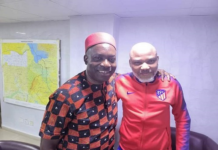INEC on Monday prayed the Kogi Governorship Election Petition Tribunal sitting in Abuja to dismiss a petition filed by the Social Democratic Party (SDP) and its candidate, Murtala Ajaka, against Governor Usman Ododo’s victory.
Mr Ododo and his party, the All Progressives Congress (APC), have also told the three-member panel of Justices, headed by Justice Ado Birnin-Kudu, to dismiss the petition in its entirety for being incompetent and lacking in merit.
The trio, through their lawyers, Kanu Agabi, Joseph Daudu and Emmanuel Ukala, stated this position while adopting their final written addresses and presenting their arguments against the SDP and Mr Ajaka’s petition.
However, Mr Ajaka’s lawyer, Pius Akubo, has urged the tribunal to dismiss the respondents’ submissions and uphold their petition.
After listening to all the parties in the petition, the tribunal reserved the matter for judgment.
Mr Ajaka had challenged Mr Ododo’s victory in the November 11, 2023, Kogi governorship poll. INEC, Mr Ododo, and APC are listed as the first, second, and third respondents, respectively.
The tribunal fixed Monday for the adoption of final written addresses after the parties closed their cases in the matter on April 25.
Upon the resumed hearing, INEC’s counsel, Mr Agabi, told the court that their final written address was dated and filed on May 2. He said the commission’s reply on point of law was dated May 8 and filed May 9.
While adopting the processes, the lawyer submitted that the petition lacked merit and was incompetent, urging the court to strike it out or dismiss it.
He argued that the Appeal Court had decided that if the grounds of a petition are inconsistent with one another and are not consistent with the reliefs, it should be struck out.
He also argued that the petitioners’ evidence was grossly insufficient, citing a Supreme Court decision in a case by Tonye Cole against INEC.
“It is to the effect that once the evidence called is grossly insufficient, there is no evidence. In that case, the petitioner filed 305 witness depositions but only adopted 40,” he said.
He said the petitioners only called 25 witnesses out of the scores listed.
Mr Agabi said that in a mathematical calculation of evidence, 3.6 per cent of Mr Ajaka’s witness deposition adopted in the petition amounted to a failure and, therefore, ought to be dismissed. The lawyer also described the case as “frivolous.”
He said the petitioners failed to file the witness deposition beforehand, contradicting the Supreme Court’s decision in Mr Obungado’s case.
Mr Agabi argued that the petitioners’ witness, who testified about the Bimodal Voter Accreditation System (BVAS) machines, clearly stated that he could not guarantee whether those were the BVAS used.
He further argued that the BVAS machine was tendered against section 84 of the Evidence Act because no certificate of trustworthiness was attached alongside it, as required by the law.
Mr Agabi argued that of the 25 witnesses called by the petitioners, no single polling unit agent was present.
While adopting his final written address dated and filed on May 1, Mr Daudu, who appeared for Mr Ododo, urged the tribunal to dismiss the entire petition.
Adumbrating, he argued that the petition was statute-barred (filed out of time).
The senior lawyer said that though the petitioners responded to their submission that “when it comes to filing, it is what the secretary of the tribunal says that determines the date of filing,” he, however, argued that the petitioners’ action was against section 122(1) and (2)(a) of the Evidence Act, which empowers the tribunal to take judicial notice of this.
However, Mr Akubo objected to Mr Daudu’s citing the section, describing it as a fresh argument.
In response, Mr Daudu disagreed with Mr Akubo’s assertion that he was raising fresh issues after a final written address had been filed.
“You cannot shut me out from making my comment. You cannot because you don’t have the power to do so,” he said.
Mr Daudu said if the court found merit in his argument, Mr Akubo had the right to respond because it bordered on issues of remittal procedure.
He also urged the tribunal to dismiss the allegations of forgery against his client, saying it bordered on a pre-election matter, which the apex court had decided in Mr Gbagi’s case against INEC.
Mr Daudu also argued that section 137 of the Electoral Act cited by the petitioners on allegations of over-voting did not apply in the instant petition.
Also backing Mr Daudu’s submission, Mr Ukala, who represented APC, urged the court to dismiss the petition for lacking merit.
The lawyer, who said their final written address, dated April 30, was filed on the same date, adopted all the processes.
The petitioners’ lawyer, Mr Akubo, told the tribunal that their final written address was dated and filed on May 6 and disagreed with Mr Daudu that their petition was filed out of time.
He argued that the respondents confirmed, even by their witness, that the petition was filed on December 2, 2023.
“I urge your lordship to hold that we filed this petition within time under our law,” he said.
After taking the arguments, Justice Birnin-Kudu reserved judgment on the petition.
“The date will be communicated to both parties,” he said.
(NAN)





